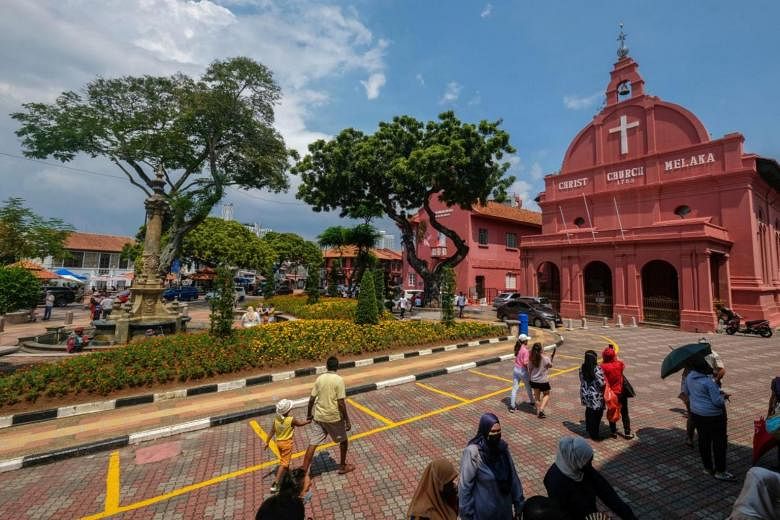KUALA LUMPUR - With no sign so far of a Covid-19 spike from the just concluded Melaka polls, Sarawak is set to follow suit in mid-December, as the ruling state coalition looks to capitalise on the tabling of a Bill to restore the status of the eastern state and neighbouring Sabah.
The Election Commission meets on Wednesday (Nov 24) to decide a date, but all indications are that Gabungan Parti Sarawak (GPS) are keen to have the vote as soon as possible. It even predicts a repeat of Melaka's wipe out for opposition leader Anwar Ibrahim's Parti Keadilan Rakyat (PKR).
"I don't give PKR any chance in this upcoming state elections. Based on my own observation, I think they will win zero seats. I may sound arrogant but looking at the present leadership of PKR Sarawak, I think they will not even secure a single seat," Parti Pesaka Bumiputera Bersatu (PBB) vice-president Abdul Karim Hamzah said last week .
His PBB is the lynchpin of the GPS coalition, which has enjoyed a two-thirds supermajority in the legislature of Malaysia's largest state for over three decades.
Analysts have attributed the pact's success to plying rural voters with handouts, while blaming the federal government for the poor state of development in densely forested north-west Borneo.
The lightning rod issue for this sentiment is the Malaysia Agreement 1963, or MA63 for short, which brought together states in the peninsula then known as Malaya, Sabah, Sarawak and Singapore - before the 1965 split - to form the country. It provided for autonomy in certain areas such as immigration, education and use of natural resources for the East Malaysian states.
But Sabah and Sarawak have in recent years stepped up their bitter complaints of perceived unfairness, tracing it back to a 1976 amendment to the federal Constitution which removed the distinction between the western and eastern states.
"Developmental politics is just as crucial in Sarawak as the rest of Malaysia, or even more so. While handouts work for the rural poor, policy or legislative measures will be trotted out as proof of the government's effectiveness to urban and progressive voters," Singapore Institute of International Affairs' East Malaysia-based fellow Oh Ei Sun told The Straits Times.
After several delays due to misgivings from politicians, Prime Minister Ismail Sabri Yaakob's government finally tabled a Bill on Nov 3 to make constitutional amendments to restore the status of Sabah and Sarawak as equal partners with Peninsular Malaysia as enshrined in the MA63.
It will require a two-thirds majority to amend the federal Constitution.
Although largely symbolic, GPS is likely to talk up its success in forcing the issue at the polls. De facto law minister Wan Junaidi Wan Jaafar hails from PBB and has been at the forefront of the move, alongside Parti Bersatu Sabah president Maximus Ongkili, the minister in charge of Sabah and Sarawak affairs.
A ruling party official told The Straits Times that "they (the two ministers) are trying their best, but it is unlikely they can wrap it up before the Sarawak polls".
Nonetheless, this offers GPS a carrot to woo voters, with the implied threat that the MA63 amendment could be scuppered if support for the ruling parties ebbs.
Although the Pakatan Harapan (PH) pact led by PKR also tried to move a similar amendment while it was in power in 2019, those who shot it down, including GPS, insisted that the language of the new clause did not go far enough, even though many observers find the differences to be superficial and semantic.
In 2016, GPS won 72 of the 82 assembly seats, with PH taking the other 10 - only three of which were won by PKR. The party's presence in Sarawak was further affected after the defections in February last year that also toppled the PH federal government.
In Melaka, despite PKR president Anwar engineering defections which resulted in the collapse of the Barisan Nasional (BN) government, BN won 21 seats while PH took just five - none won by PKR which lost all 11 seats it contested.
Sarawak was placed under a localised emergency after its state assembly's term expired in June when Malaysia was still deep in the throes of its deadliest Covid-19 wave.
When it was lifted last month, speculation was rife that a ballot could be held at the same time as the Nov 20 Melaka vote or immediately after, with GPS leaders stating they were ready to face voters this month.
By law, polls must be held within 60 days of the assembly's dissolution, or early January in this case.
However, the Ismail administration - of which GPS is a component - has been wary of repeating the huge surge in Covid-19 infections that followed the Sept 2020 election in Sabah.
Strict rules barred most physical campaigning in Melaka, although the Election Commission has promised some relaxation in Sarawak, as the huge state is largely rural and less densely populated.


